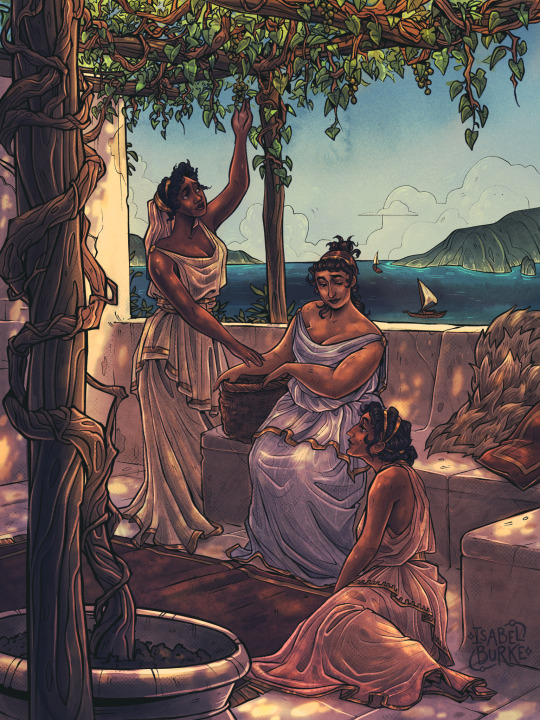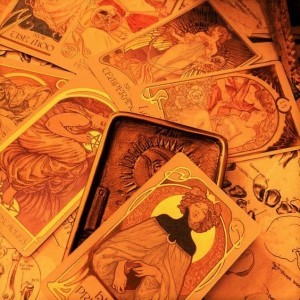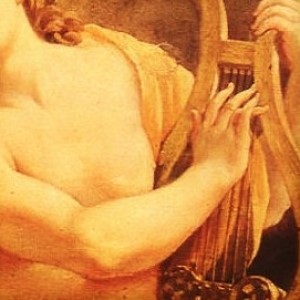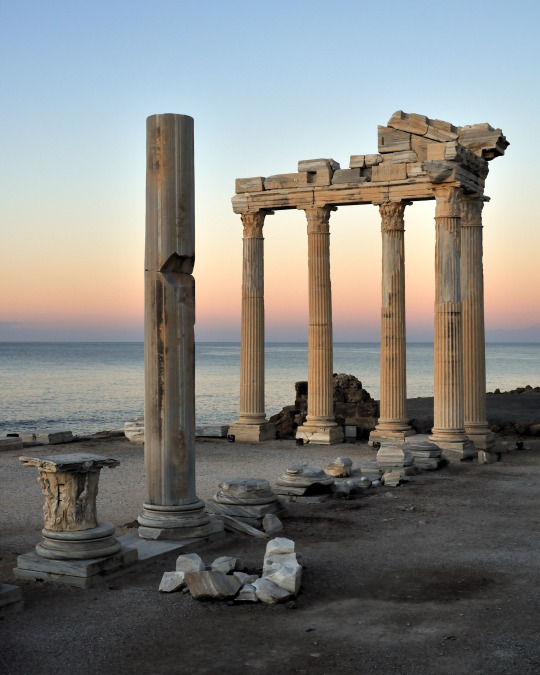Text
Flameless Hearths & Devotions

Ideas for Hestia devotees/worshippers who are unable to use a fireplace or flames in their worship. Welcome for all who find this helpful!
Using flames safely and/or discreetly:
(For the occasional need)
Use a tea light or lighter outside; on a fire-safe surface such as concrete or gravel.
Burn objects over your sink or a bowl of water.
Outdoor fire pits or grills.
Creating your hearth:
Your hearth should feel like a central, focused place that represents your home. Someplace where you feel calm and safe. Traditionally, this was often in the kitchen; but it can be anywhere in your home. It can also be in multiple places, or small and contained.
My shelf altar. I keep it clean and tidy. It contains items that remind me of home, and offerings to Hestia. It represents hearth and home, and is a space I can visit when I wish to feel connected to her.
My dedication wall. I used to have a wall with a dried marigold garland, soothing poetry, devotional poetry, artwork and prayers on it. This is an excellent way to have a discreet (if you so choose) dedicated space that doesn’t take up much surface area.
My stovetop. Each time I put the kettle on for tea, I feel connected to Hestia. I offer the first sip to her. I simmer pots of water with herbs, spices or other scented things (such as orange peels) to spread a beautiful aroma around my home.
Don’t have a stove? An electric kettle and microwave will do!
My oven. Each time I bake (both the preparation and the baking itself) I feel connected to her and give a portion as an offering.
My woodstove or outdoor firepit. It is worth noting that because I have these things (and use my woodstove as a primary heating source) I do often use these as my hearth and burn offerings here.
Flame and candle alternatives:
What feels right to you? What matches the energy/warmth of fire and flame?
Electric candles, especially ones that flicker and have warmer colors.
Electric tealights in candle holders.
Solar charged lanterns
Fairy lights in a jar
Himalayan salt lamp
Wax or oil warmers (with heat bulbs).
Electric fireplace
Flame ambiance videos
Scents:
For me, certain smells embody home. And this is wonderful, because we can control them–even without candles or incense!
Essential oil or reed diffusers
Wax or oil warmers
Scented electric candles
Potpourri
Scented sachets
Room/pillow sprays
Pot of water on the stove with scented things
You may also like:
Resources for Hestia devotees - a masterpost
Hestia small devotional acts
Bedridden devotion to Hestia
943 notes
·
View notes
Text
I went to the Detroit Institute of Art today and felt blessed to find a painting of Hygeia there. 🐍



240 notes
·
View notes
Text
Bedridden and Low Energy hellenic polytheist tips

Thank you to all my spoonie and low energy friends! You’re the best for helping me create this! Especially since I too, get low energy due to my mental problems. I hope this helps anyone who reads this!
Burn candles and incense for them! These are honestly my go-to low energy offerings.
Devoting research sessions to them.
Play music in their honour! Maybe add some candles or incense too!
Diffuse oils (if they’re safe for you to breathe/use. Make sure to use them properly. Your health comes first.) Especially if they’re from a plant sacred to them.
Offering portions from your meals and such
Khernips in a spray bottle.
Devoting guided meditations to them
Take your medication as a devotional act
Digital colouring apps as devotional act
Offering colouring book pages (or the book itself!)
Drawing your god/hero/etc.
Divination from your bed, but Divination can be rather draining so keep that in mind.
Wearing jewellery/clothing/etc that reminds you of them
If you make deity sigils, sewing/embroidering them onto a pillow can be great
Offering sewing, chitons (this is historical : D), embroidery, etc.
Making jewellery and offering it as a votive offering.
Reading/singing hymns/poetry for them
Praying is worship, so pray your heart out.
Devotional Pinterest boards
Offering water/tea/etc
Sculpting clay votives if you have the energy/time/etc! It’s very fun and painting them is super fun. Clay votives are also historical so you can definitely do this and be more recon heavy.
Maintaining a devotional blog to your god(s)/hero(es)
Just know what if you’re not actively able to worship, it’s okay. They understand what’s going on. Don’t judge yourself.
If anyone else has more ideas, please add on! I’d love to have more suggestions.
726 notes
·
View notes
Text
Hellenic Polytheist Groups to Avoid (WIP)
Dodecatheon - Homophobia. They don’t allow same-gender marriage and don’t let gay people be priests or priestesses, as Timothy Jay Alexander says (and defends). They are also obsessed with swastikas and the ‘roman salute’ which is a white nationalist tactic.
YSEE - Homophobia, xenophobia, and anti-Indigenous racism. They don’t perform same-gender marriage. It’s in their FAQ and their justification is bullshit too. Here is an elaboration on their refusal to officiate same-gender marriage, employing the ‘slippery-slope’ fallacy so typical of the worst part of monotheists they despise. Here’s an excerpt:
If we change even once our ritualistic Tradition then there will be no Tradition (ritualistic, I repeat!) at all, because then we’ll have to perform marriage ritual also for a polygamist with 5 brides, also for a nudist couple that may want to be blessed nude, also for a BDSM couple that may want the one part collared, and so on.
They are also nationalistic and deeply antisemitic, making some islamophobic statements at times too.
Church of Hellenes - extremists. They literally advocate for the use of violence to make Hellenismos a national religion. Delusional as fuck.
Elaion - Falls into a lot of the same traps of ahistoric anti-”monotheism” rhetoric as well as nationalistic usage of “Dodekatheism”. Most importantly, the moderators were quite late to kick racists in response to BLM (2020) and Elani Temperance admitted that bigots who were quiet about their beliefs would be allowed to stay. More on that here and here.
Hellenion - Thinks Heterophobia is real. Their bylaws are a bunch of horseshit. Islamophobia and anti-Semitism in the guise of anti-monotheism. Run by an anti-Vaxxer literally named Karen.
Ellinais/A.E.T.H. - Xenophobia (translated article here). Deeply and violently anti-immigrant. Nationalist and anti-Turkish articles by PR officer Leonidas L. Billis.
1K notes
·
View notes
Text
The Delphic Maxims
The Delphic Maxims are aphorisms believed to have been spoken by Apollo through the Pythia at Delphi in response to queries.
The first three maxims were inscribed on the walls and/or columns* of the Temple of Apollo at Delphi as early as the 6th century BCE. It seems that the lettering was probably duplicated each time the temple was rebuilt (it was destroyed in the 4th century BCE, in the 1st century BCE, and again in the 1st century BCE) because Pliny and Plutarch describe the inscriptions as having been engraved in letters of gold. Ancient Greek writers were recording and interpreting the Maxims by the second half of the 6th century BCE.
*Ancient sources disagree on the location - the walls? the columns? the doors? the gate?
1. Follow God
2. Obey the law
3. Worship the Gods
4. Respect your parents
5. Be overcome by justice
6. Know what you have learned
7. Perceive what you have heard
8. Know yourself
9. Intend to get married
10. Know your opportunity
11. Think as a mortal
12. If you are a stranger, act like one
13. Honor the hearth (or Hestia)
14. Control yourself
15. Help your friends
16. Control anger
17. Exercise prudence
18. Honor providence
19. Do not use an oath
20. Love friendship
21. Cling to discipline
22. Pursue honor
23. Long for wisdom
24. Praise the good
25. Find fault with no one
26. Praise virtue
27. Practice what is just
28. Be kind to friends
29. Watch out for your enemies
30. Exercise nobility of character
31. Shun evil
32. Be impartial
33. Guard what is yours
34. Shun what belongs to others
35. Listen to everyone
36. Be (religiously) silent
37. Do a favor for a friend
38. Nothing to excess
39. Use time sparingly
40. Foresee the future
41. Despise insolence
42. Have respect for suppliants
43. Be accommodating in everything
44. Educate your children
45. Give what you have
46. Fear deceit
47. Speak well of everyone
48. Be a seeker of wisdom
49. Choose what is holy
50. Act when you know
51. Shun murder
52. Pray for things possible
53. Consult the wise
54. Test the character
55. Give back what you have received
56. Look down on no one
57. Use your skill
58. Do what you mean to do
59. Honor a benefaction
60. Be jealous of no one
61. Be on your guard
62. Praise hope
63. Despise a slanderer
64. Gain possessions justly
65. Honor those who are good
66. Know the judge
67. Master wedding-feasts
68. Recognize fortune
69. Flee a pledge
70. Speak plainly
71 Associate with your peers
72. Govern your expenses
73. Be happy with what you have
74. Revere a sense of shame
75 Fulfill a favor
76. Pray for happiness
77. Be fond of fortune
78. Observe what you have heard
79. Work for what you can own
80. Despise strife
81. Detest disgrace
82 . Restrain the tongue
83. Keep yourself from insolence
84. Make just judgments
85. Use what you have
86. Judge incorruptibly
87. Accuse only one who is present
88. Tell when you know
89. Eschew force
90. Live without sorrow
91. Live kindly among others
92. Finish the race with confidence
93. Deal kindly with everyone
94. Do not curse your children
95. Guide your spouse
96. Benefit yourself
97. Be courteous
98. Give a timely response
99. Struggle with glory
100. Act without repenting
101. Repent of your errors
102 Control the eye
103. Give a timely counsel
104. Act quickly
105. Guard friendship
106. Be grateful
107. Pursue harmony
108. Keep secret what should be secret
109. Fear ruling
110. Pursue what is profitable
111. Accept due measure
112. Do away with enmities
113. Accept old age
114. Do not boast in might
115. Exercise (religious) silence
116. Flee enmity
117. Acquire wealth justly
118. Do not abandon honor
119. Despise evil
120. Venture into danger prudently
121. Do not tire of learning
122. Do not stop to be thrifty
123. Admire oracles
124. Love whom you rear
125. Do not oppose someone who is absent
126. Respect the elderly
127. Instruct the youngs
128. Do not put your trust in wealth
129. Respect yourself
130. Do not begin to be insolent
131. Crown your ancestors
132. Die for your country
133. Do not be discontented by life
134. Do not ridicule the dead
135. Share the load of the unfortunate
136. Gratify without harming
137. Grieve for no one
138. Beget from noble routes
139. Make promises to no one
140. Do not wrong the dead
141. Be well off as a mortal
142. Do not trust fortune
143. As a child be well-behaved
144. As a youth, be self-disciplined
145. As of middle-age be just
146. As of old -age, be sensible
147. On reaching the end, be without sorrow
1K notes
·
View notes
Text
Divination Tools: Accessible, Online, Free
How do I know what this mean? What do they want? Is this god trying to tell me something?
Ask them.
My answer to questions about the behaviour of the theoi is going to be “try divination” 99.9% of the time (I didn’t say it recently, once, and it’s eating at me).
Here are some online tools relevant to hellenic polytheism that you can freely access from your phone or PC. I personally use and recommend these, and know others in the community use them as well.
Homeromanteion
The Homeric Oracle, an oracular text-based tool that casts three dice to generate one of 216 possible numbers relating to a line selected from Homer’s Iliad or Odyssey.
Sortes Virgilianae
Sortes Virgilianae is an ancient method of seeking advice or telling your fortune through passages selected randomly from works by the Roman poet Virgil. There’s also a Latin version if you’re interested.
Apollo’s Oracle
Apollo's Oracle is a divination app based on the ancient Greek divination system tied to the Greek alphabet. Phone app is currently available for Android only. Online version linked above.
339 notes
·
View notes
Text
Hesiod's "Works and Days" is a collection of advice, right?
A lot of it is basically an ancient Greek "Old Farmer's Almanac," and hardly applicable to anyone anymore. All of it is written for men with arable land and slaves to work that land, and so plenty of it is not applicable for that reason.
But there's some good advice to be gleaned from the book, nonetheless.
The gods care about how we care for each other. I think we remember theoxenia quite well, and remember the beauty of the reciprocal exchange with the gods. But I think some of us find it more difficult to keep in mind the importance of xenia. We must be good to one another. (However, the nature of reciprocity means that you do not need to accept poor treatment, nor should you!)
Hesiod mentions being certain to pray at the beginning and end of each day. I've seen others do this, and I've tried in the past to follow this practice. Your own worship rules/schedule is personal, and will inevitably differ from others'. But it's not a bad idea to find a schedule that works for you, to regularize prayer in your life. (PomegranateAndIvy posted a podcast episode on Spotify on 12/07/2020 about personal worship rules. Podcast title "For the Glory of the Theoi". It's worth a listen.)
The two Strifes reminds me of a psychological concept... "a spoonful of anxiety is a good thing. A cupful is disastrous." Stress and anxiety, these are emotions we developed to keep ourselves safe. They serve a purpose, but in excess, can be destructive. There's a Delphic Maxim about moderation in all things, I'm sure. Even if not, well. I'm not a huge fan of Stoicism, but moderation is inherent in the concept of Sophrosyne. And was it not excess --- of battle frenzy, of pride, etc --- that cut down so many heroes?
Line 238 talks of how one man's cruel deeds can spell destruction for the whole city. Zeus does not smile upon a culture that looks the other way where injustice is concerned. We cannot tolerate cruelty. What this means in your particular environment/city/etc, I cannot say. But it is worth ruminating. "How can I show the gods, in a concrete way, that I will not tolerate acts of bitter, unjust cruelty?"
Don't ask me to cite it, but there's a hint of the idea that regularity of prayers and offerings is more important to the gods than the lavishness of the offerings. One who pours a libation of water and prays at dawn and dusk is more loved by the gods than one who offers the grandest statue once every few years. Regular prayer establishes, maintains, and strengthens a relationship. If you only pray at midterms and finals, well, that's okay, but it's asking for favors, not building a personal relationship, in my view.
There's a good heaping scoop of misogyny in "Works and Days" and some unfortunate economic opinions.
But even flawed sources help us understand how the ancients incorporated religion into their daily lives, and that's valuable
186 notes
·
View notes
Photo

Zeus (seated) and Leto with their offspring Apollo and Artemis. Marble relief from the sanctuary of Artemis at Brauron, artist unknown; ca. 420-410 BCE. Now in the Archaeological Museum of Brauron.
2K notes
·
View notes
Photo

Fragment of a terracotta loutrophoros (ceremonial vase for water), Painter of Bologna 228, ca. 460 B.C., Metropolitan Museum of Art: Greek and Roman Art
Rogers Fund, 1907
Size: H.: 17 ½ x 12 in. (44.5 x 30.5 cm)
Medium: Terracotta
https://www.metmuseum.org/art/collection/search/247950
17 notes
·
View notes
Text
Festivals we know (almost) nothing about - Part 2
This is the second part of this post. Please refer to its introduction for details if you haven't read it yet. As stated in the disclaimer last time: this list is in no way exhaustive, as I have taken out deme-specific festivals, festivals relating to hero-worship or political events / commemorations. Again, all information comes from Parker R., Polytheism and Society at Athens, 2005 unless stated otherwise.
The Hephaisteia
There's a bit of speculation about this festival to Hephaestus and Athena. The festival is known from a fragmentary inscription dating of 421 BC, but it is unsure whether this is a new festival or if it's been reorganized/revamped at this date (Parker leans for the latter option). Either way, because this is a festival to Hephaestus and Athena, we can assume that it was somewhat similar to the Prometheia, which hosted a torch-race.
The Herakleia
We know of at least 4 separate events bearing the name of Herakleia in Attica, either as genos/deme festival or as athletic festival. With this information in mind, it seems like Herakles has been widely worshipped in Attica, though the organization of such events seems to have been more local. While we know no dates about this cluster of festivals to Herakles, there is a possibility that there were two Herakleia in successive months, one in Hektombaion and one in Metageitnion.
The Kalamaia
A badly known festival to Demeter, present in at least Piraeus and Eleusis. Ionna Patera places the festival on Skirophoron 16 (only 4 days after the Skira...), but I have not seen this datation being confirmed elsewhere. Parker classifies it as of unknown date and instead theorizes it could perhaps fall in Hekatombaion. The word kalame refers to the stalk of the corn, indicating an explicit link with the harvest cycle. We know that in Eleusis, the celebration included a sacrifice and a procession.
Additional resource: Ioanna Patera, When “women gather in accordance with tradition”. IG II1177 and women-only festivals, 2015
The Kallynteria
A festival in honor of Athena which seems to be have been linked to the Plynteria: while the Plyntheria focused on the cleaning of the goddess' image, the Kallynteria seems to have been a time to clean the temple itself in preparation for the Plynteria. The datation is also contested: Photius tells us the festival fell on Thargelion 19, but this date is shared with another festival - the Bendidea- which would be unusual. Additionally, Aristokles of Rhodes states that "the festivals of Athena" succeed the Bendidea. It is possible still that the festival could have been on Thargelion 20 or somewhere in the last third of the month.
The Metageitnia
A festival to Apollo Metageitnios that probably happened during the month of the same name (Metageitnion - August/September). We can assume it was held on the 7th day, according to the logic of the other festivals for Apollo, but we do not have any proof of this timing. The celebration is also found outside of Athens (Oblia, Miletus), which leads to believe that it probably took its origin outside of Athens and was brought over at some point.
Additional resource (in French): Mihai Feraru Remus, Fêtes civiques et calendriers dans les colonies milésiennes du Pont-Euxin. In: Dialogues d'histoire ancienne
The Maimakteria
A festival to Zeus for which the date is unknown present in the Ionic-Attic calendar. It was probably held during the month of the same name, Maimakterion (November-December). It seems to have been focused on Zeus' role as a storm god and was probably a very old celebration that lost in importance over time. Late-autumn and early winter seems to have been particularly linked to rain and storm, as we can see from Anacreon's fragment 19:
In the month of Poseidon, When the clouds are fat with rain, Wild storms bring us Zeus.
Aside from the logical practical association, the presence of a festival to Zeus on the month just before Poseidon doesn't seem out of place.
The Nemeseia
There is contradictory information regarding this festival (or festivals). On one side, we know of an athletic festival in honour of Nemesis of Rhamnus which seems to have occurred on Hekatombaion 19 (July-August).
On another side, some sources mention a Nemeseia that was a festival of the dead. Parker suggests that this one could be a confusion with the Genesia, in which case it would be held on 5th of the month of Boedromion (Bekker, Anecd. pp. 86, 231, and 282). We know nothing of the rites and ceremonies observed in this context. There is not enough evidence to support anything.
The Niketeria
According to Proclus, the Niketeria was a festival to Athena meant to celebrate the goddess' victory over Poseidon. This is an event for which we again have contradictory information: Plutarch tells us the opposite about this day, which he says falls on Boedromion 2, saying that it was "omitted" by the Athenians instead of celebrated.
The Pandia
The Pandia falls at the very end of the City Dionysia. It seems to have been originally a festival to Zeus, but it's likely that it got sucked into the City Dionysia and lost importance over time.
The Prometheia
Festival to Prometheus, joined with Athena and Hephaestus. No date known, but the festival included torch races.
The Stenia
Apparently a women-only festival to Demeter & Persephone that, according to Aristophanes is "two days before the Thesmophoria, on Pyanopsion 9". What confuses scholars about this one is the timing and its alleged purpose: Pyanopsion is an autumn month, but the festival is supposed to be about the coming up of Kore. If this was the case, it would make more sense if it was placed in spring. Erika Simon* hypothesises that the Stenia might have been the moment where the piglets were thrown in pits and then recovered during the Thesmophoria. Again, there is too little evidence to be sure of what the festival exactly entailed, especially with its close chronological proximity to the Thesmophoria.
*Simon E., Festivals of Attica: An Archaeological Commentary, 1983
140 notes
·
View notes
Text
Festivals we know (almost) nothing about
- Part 1
Once in a while, it's good to remember that none of our calendars are complete. This is much more obvious with non-Attic/Athenian calendars, and anyone who decides to jump into attempting to reconstruct the cultic calendar of Delphi, Delos, Sparta, Argos etc. will know exactly what I mean, as they are painfully fragmentary (not to mention the ones that are completely lost).
Because of the contrast between the fairly well-preserved Athenian calendar and the others, we often forget that Athenian calendar we know about is only "well-preserved" but by no means complete.
Back in January, I decided to make an user-friendly calendar and I had to make several choices about how to keep it simple. One of those choices was to get rid of obscure festivals, especially when their date or content is unknown or highly speculative.
The downside of my project is that it further solidifies this illusion of completeness. This is why I'm making this post: here's the list of Athenian festivals we know by name that haven't made it into my calendar for the reasons mentioned above. Emphasis on "know by name", because there's probably a few we completely lost as well. This list likely isn't going to be exhaustive either (took out deme-specific festivals, hero worship, battle commemoration festivals etc. + I probably forgot stuff).
Note 1: This will be cut in parts of 10 festivals because there's really a lot.
Note 2: The aim isn't to tell people to add all of those holy days and festivals to their calendar, that would be way too much for a single person. Rather, this list is meant as inspiration for worshippers, especially those who have relationships with less widely worshipped deities.
The Adonia
Date unknown but probably happened in the summer. We actually have decent information on this one, aside from the date issue. It was primarily a festival for women. A few days before the festival, they would go plant young sprouts of lettuce and other garden plants and cereals on the rooftops. The sprouts, being left out in the sun, would quickly die, which was meant to represent the tragic short-life of Adonis. On the day of the festival, the women would come back on the roof to cry and mourn the death of Adonis.
For a complete study and contextualization of this festival, see "The Athenian Adonia in Context: The Adonis Festival as Cultural Practice" by Laurialan Reitzammer.
The Aiora
A swinging festival of unknown date, though there is debate about it being part of the Anthesteria. The Aiora was probably connected to the death of Erigone.
The Amarysia
Pausanias is our only source of a cult to Artemis Amarysia in Athens (Description of Greece 1. 31. 5):
"Amarynthus is a town in Euboea, the inhabitants of which worship Amarysia, while the festival of Amarysia which the Athenians celebrate is no less splendid than the Euboean. The name of the goddess, I think, came to Athmonia in this fashion and the Colaenis in Myrrhinus is called after Colaenus."
We have no further information for this cult in Athens specifically.
The Anthesphoria
This one is tricky to fit in the list, because we have very little proof this was ever celebrated in Athens, and most of our sources on the festival trace back to Sicily, even though there are indications it was held in other parts of the Greek world. It was a festival of the flowers focusing around Persephone and Demeter. It was probably held in early spring, if we take into consideration the common stem between Anthesphoria and Anthesterion (anthes = flower), the Attic month of February-March, which alludes to the abundance of flowers during this time of the year.
For a more complete post on this festival, see @verdantlyviolet's breakdown. For a study, see "Hera’s Lettuce Women and the Peculiar Uses of Flowers, Fruit and Vegetables in Ancient Greek Festivals for Women" by Lucinda Guzman (Master's thesis)
The Arrhephoria
Festival held in honour of Athena and Pandrosus, date unknown but it seems to have been linked to the Acropolis.
The Asklepieia
Probably a set of two festivals to Asklepios, one occuring in winter (between the Lenaia and the City Dionysia, so roughly between January and March/April) and another roughly six months later, between the Eleusinia and the Thesea. At this point, it is believed that the latter actually is known under the name of Epidauria, which was celebrated on Boedromion 17 or 18 (around September). Whereas the first festival would fit with an observance to Asklepios known to happen on Elaphebolion 8. It was probably at those two festivals that doctors would make their sacrifices to the god.
The Diisoteria
Two dates are known for this festival to Zeus Soter and Athena Soteria, as there are indications this festival has been changed over the centuries. The original date was Skirophorion 30, the last day of this month (somewhere between June and July, most likely - which also happens to be New Year's eve for the Attic calendar). According to R. Parker, the date was moved in the 4th century BC to be earlier in the month, before Skirophorion 11. A decree from the 2nd century BC indicates Asclepius and Hygieia were also added to the list of recipients.
The Elaphebolia
Festival to Artemis, probably in the month of the same name (Elaphebolion - March/April). We can assume it was held on the 6th day, but we have no certainty. The preparation of ‘deer’ cakes (probably in private houses?) attested by Athenaeus is all that we can be sure of.
The Galaxia
Festival in honor of Cybele, the Mother of the Gods. No date known. For the occasion was offered a golden bowl with ‘galaxias’, a mixture of barley flour and milk.
The Genesia
Festival celebrating the dead, most likely dead parents. It was held on Boedromion 5 (late August - early September). Details are blurry, it's possible this was mostly a private, familial celebration. If there was a public rite distinct from private commemorations, we do not know where it was held.
_______________________
Unless stated otherwise, most of the information is taken from Parker R., Polytheism and Society at Athens, 2005
313 notes
·
View notes
Photo

The messenger-god Hermes, wearing his winged sandals and carrying his herald’s staff (kerykeion). Attic red-figure lekythos (oil-flask), attr. to the Tithonos Painter; ca. 480-470 BCE. Now in the Metropolitan Museum of Art.
587 notes
·
View notes
Text
The Theoi and Ritual Participation

This vase portrays Athena and a mortal woman performing a libation together. In her article "The Greek Libation Bowl as Embodied Object," Milette Gaifman briefly explores the Theoi partaking in religious ritual.
"From the turn of the fifth century BCE onwards, and throughout the Hellenistic and Roman periods, gods, goddesses and heroes were often portrayed holding out a phiale, or patera. Divinities are shown either extending the bowl as though awaiting liquid offerings, like the small Hellenistic terracotta of Aphrodite holding out her phiale, or they are portrayed actively participating in the making of libations. These renderings of deities have been a subject of an animated scholarly discussion. For more than a century, authorities in classical art and archaeology and in the history of ancient religions have been contemplating the reasons for the representation of gods partaking in devotional activities. Mortals make offerings, sacrifices and libations in order to appease and thank the gods, in hope of divine good will. Why then should the gods – as the intended recipients of these rituals – engage in such religious activities themselves?"
Gaifman presents a few solutions, some her idea and others drawn from other scholars:
The gods are serving as divine models for human piety, like Jesus Christ to his disciples
that they draw upon mythological narratives
that they encapsulate ideas about divine sufficiency
they express a form of divine reflexivity
Later, Gaifman discusses libation bowls being a gift to the dead, possibly suggesting that the Theoi participating in libation are acknowledging the unavoidable death of mortals and are gifting the libation to us. That's more my own theory, so if it's too wild let me know why you think so.

(Gaifman holding a phiale)
"It appears, however, that although such images are perplexing from a modern perspective, from the ancient point of view, they presented no theological conundrum. It was perfectly normal to show and imagine gods engaged in rituals and holding out ritual implements."
Gaifman discusses how the phiale is such a frequently occurring object in divine imagery that when a god is shown to be holding something unidentifiable it is assumed by scholars to be a phiale. Some scholars have argued that it is a religious symbol similar to a halo in Christian iconography, but Gaifman emphasizes that a phiale connotates action.
"A phiale held by a deity evokes the receiving of liquids and even participation in ritual. Compare, for instance, the image of Athena not only holding the phiale but also actively partaking in a libation (see plate 10 [top of post]) with the image of Athena holding her armour and facing a worshipper (see plate 2 [bottom of post]). In the former, the goddess is a recipient who is simultaneously engaged in a pious act; in the latter, the goddess cannot participate in any ritual, for her hands are full. The statuette of Aphrodite, then, suggests that the goddess is awaiting the pouring of a liquid into her vessel and that she may even partake in a libation, by letting some of the liquid trickle down. The small image alludes to the possibility of a divine engagement in the ritual."
Gaifman then discusses the agency of the Theoi, noting that when she physically handled a phiale she could feel what complete control she had over its motion. (Check out the images in the middle of the post of her holding it with her fingers in the ring at the bottom. The first half of her article is dedicated to the material culture of the phiale and how its physical form played a role in libations.)
"A deity holding such a vessel may partake in the ritual, but that deity can also choose not to participate. The figure of a divinity with bowl in hand signals anticipation of an offering, but engagement in the ritual depends on the will of that god. As an attribute of the divine, the phiale does not merely designate sanctity, like a halo emitting light. Rather, it casts the relationship between mortals and immortals as one of interaction, albeit of an asymmetrical kind. The gods remain superior to mortals; they constantly await human acts of giving and, if they so choose, they can respond to the bringing of liquids to their vessels with participation in a divine libation."
What does this mean for us?
If anyone is interested in reading the article for themselves, I have it in this google drive folder. There's some great stuff on material culture and its relationship to society at large. I'd love to hear what you glean from it!
What I took away from this first and foremost is that the gods can be active in our acts of worship with them. This has always been a part of hellenism and kharis for me; when I interact with the gods even a little, I am pushed to engage further. The fruits of my discipline in making offerings is connection with the Theoi.

75 notes
·
View notes
Text

i want what they have🥲
✦ find me on instagram @the.flightless.artist ✦
12K notes
·
View notes
Photo









There is something bright, something soft, something warm about your very name; as if only uttering it makes the sun shine through. There is certainty in your wake, your gentle presence, your loving touch. You are molten gold and sunlit dripping honey; you are sweetness of oranges and steady smoke flow of burning cedarwood. You are encompassing, and all-embracing, and you are in all around for your music is heard in everything; and there is joy of your dance in each blow of warmth-filled wind.
You are the sun, and there is nothing but love in your golden gaze.
Shine on, o’ most beloved.
733 notes
·
View notes



